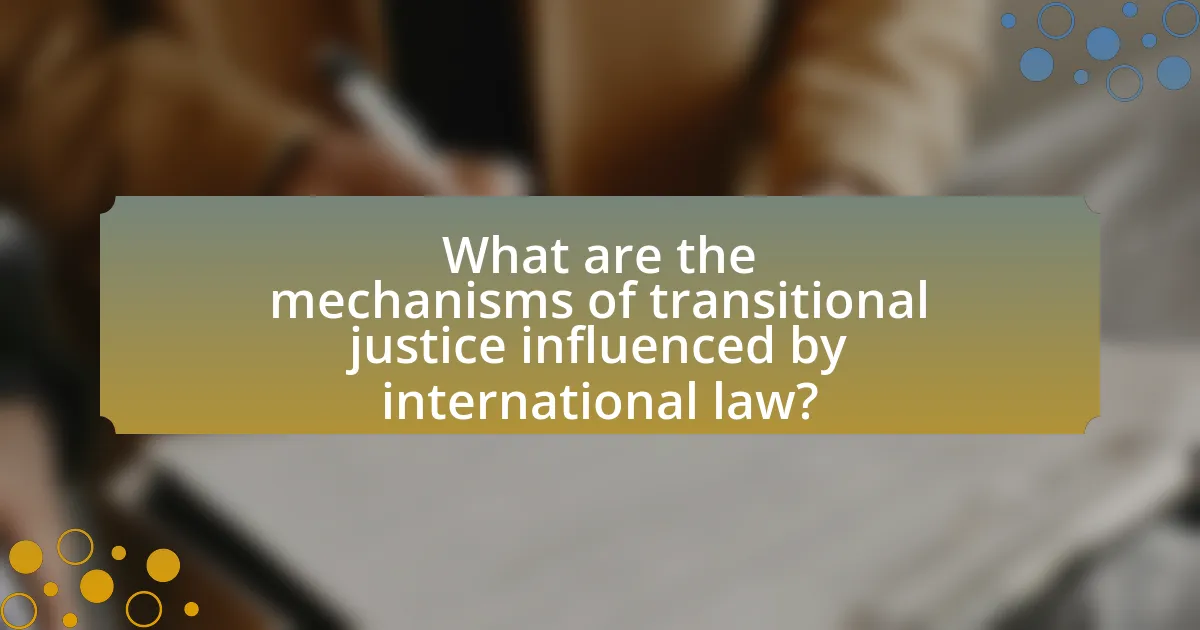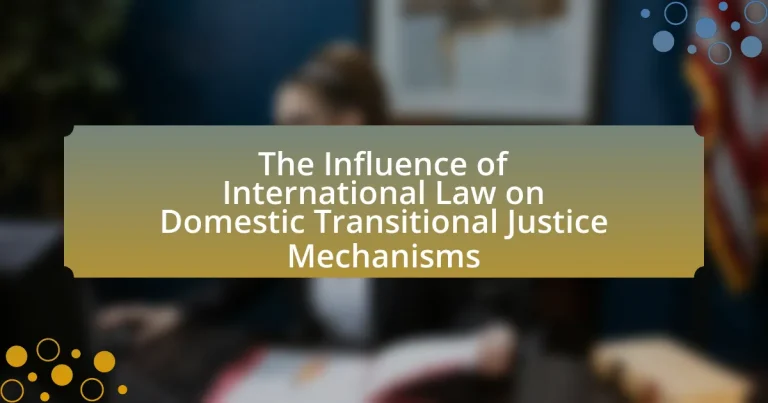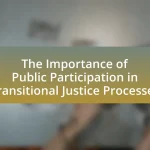The article examines the influence of international law on domestic transitional justice mechanisms, highlighting how legal frameworks and standards established by international treaties guide states in addressing past human rights violations. Key principles such as accountability, the right to truth, and reparations are discussed, illustrating their integration into national legal systems. The article also explores the role of international treaties in shaping domestic processes, the importance of aligning these mechanisms with international obligations, and the challenges faced in implementation. Additionally, it emphasizes the significance of stakeholder engagement and best practices for enhancing the effectiveness of transitional justice initiatives.

What is the Influence of International Law on Domestic Transitional Justice Mechanisms?
International law significantly influences domestic transitional justice mechanisms by establishing legal frameworks and standards that guide states in addressing past human rights violations. For instance, international treaties such as the International Covenant on Civil and Political Rights and the Convention Against Torture set obligations for states to ensure accountability and provide remedies for victims. Additionally, the principles outlined in the Rome Statute of the International Criminal Court emphasize the importance of justice, truth, and reparations, which domestic mechanisms often incorporate to align with international norms. This alignment not only enhances the legitimacy of domestic processes but also facilitates international support and cooperation in transitional justice efforts.
How does international law shape the framework of transitional justice?
International law shapes the framework of transitional justice by establishing norms and standards that guide states in addressing past human rights violations. These norms, such as the principles of accountability, truth, and reparations, are articulated in various international treaties and conventions, including the International Covenant on Civil and Political Rights and the Convention Against Torture. For instance, the establishment of the International Criminal Court has reinforced the obligation of states to prosecute war crimes and crimes against humanity, thereby influencing domestic legal frameworks to incorporate similar accountability measures. Additionally, international law provides a basis for victims’ rights, ensuring that they have access to justice and reparations, which is essential for the legitimacy and effectiveness of transitional justice processes.
What are the key principles of international law relevant to transitional justice?
The key principles of international law relevant to transitional justice include accountability, the right to truth, reparations, and guarantees of non-recurrence. Accountability mandates that perpetrators of serious crimes, such as war crimes and crimes against humanity, face justice, as established by the International Criminal Court and various ad hoc tribunals. The right to truth ensures victims and society have access to information about past abuses, supported by instruments like the UN Declaration on the Right and Responsibility of Individuals, Groups, and Organs of Society to Promote and Protect Universally Recognized Human Rights and Fundamental Freedoms. Reparations involve compensating victims for harm suffered, as outlined in the UN Basic Principles and Guidelines on the Right to a Remedy and Reparation. Lastly, guarantees of non-recurrence focus on preventing future violations through reforms in institutions and legal frameworks, as emphasized in the UN’s Transitional Justice Framework. These principles collectively guide states in addressing legacies of conflict and human rights violations.
How do international treaties impact domestic transitional justice processes?
International treaties significantly influence domestic transitional justice processes by establishing legal frameworks and standards that countries are expected to follow. These treaties, such as the Rome Statute of the International Criminal Court, create obligations for states to prosecute war crimes, genocide, and crimes against humanity, thereby shaping national legal systems and policies. For instance, countries that ratify such treaties often incorporate their principles into domestic law, which can lead to the establishment of truth commissions, reparations programs, and judicial mechanisms aimed at addressing past human rights violations. This alignment with international norms not only enhances accountability but also fosters public trust in the justice system, as seen in countries like South Africa and Argentina, where international legal standards guided their transitional justice efforts.
Why is the relationship between international law and domestic transitional justice important?
The relationship between international law and domestic transitional justice is important because it establishes a framework for accountability and human rights protection in post-conflict societies. International law provides legal standards and norms that guide domestic processes, ensuring that transitional justice mechanisms align with global human rights obligations. For example, the principles outlined in treaties such as the International Covenant on Civil and Political Rights influence national legislation and judicial practices, promoting fair trials and the right to truth. This alignment helps to legitimize domestic efforts, fosters public trust, and enhances the effectiveness of justice initiatives by ensuring they are consistent with internationally recognized standards.
What role does international law play in promoting accountability for human rights violations?
International law plays a crucial role in promoting accountability for human rights violations by establishing legal frameworks and mechanisms that hold perpetrators accountable. These frameworks include treaties such as the International Covenant on Civil and Political Rights and the Convention Against Torture, which obligate states to prevent and punish human rights abuses. Additionally, international courts, such as the International Criminal Court, provide avenues for prosecution of individuals accused of serious violations, thereby reinforcing the principle that such acts cannot go unpunished. The existence of these legal instruments and institutions serves to deter future violations and encourages states to implement domestic laws that align with international standards, thereby enhancing accountability at the national level.
How does international law influence victims’ rights in transitional justice mechanisms?
International law significantly influences victims’ rights in transitional justice mechanisms by establishing legal frameworks that prioritize accountability, reparations, and participation. Instruments such as the United Nations Declaration of Basic Principles of Justice for Victims of Crime and Abuse of Power outline the rights of victims to access justice, obtain reparations, and participate in proceedings. These international standards compel domestic legal systems to incorporate victim-centered approaches, ensuring that victims’ voices are heard and their rights are protected during transitional processes. For instance, the International Criminal Court’s Rome Statute explicitly recognizes the rights of victims to participate in proceedings and seek reparations, thereby setting a precedent for national jurisdictions to follow.

What are the mechanisms of transitional justice influenced by international law?
Transitional justice mechanisms influenced by international law include truth commissions, criminal prosecutions, reparations programs, and institutional reforms. Truth commissions, such as the South African Truth and Reconciliation Commission, aim to uncover past human rights violations and promote national healing. Criminal prosecutions, exemplified by the International Criminal Court, hold perpetrators accountable for war crimes and genocide, reinforcing the principle of accountability under international law. Reparations programs provide compensation to victims, aligning with international human rights standards that recognize the right to remedy. Institutional reforms, often guided by international legal frameworks, seek to strengthen rule of law and prevent future abuses, as seen in various post-conflict societies. These mechanisms collectively reflect the integration of international legal principles into domestic transitional justice efforts, promoting accountability, truth, and reconciliation.
What types of transitional justice mechanisms exist?
Transitional justice mechanisms include truth commissions, criminal prosecutions, reparations programs, and institutional reforms. Truth commissions, such as South Africa’s Truth and Reconciliation Commission, aim to uncover past human rights violations and promote national healing. Criminal prosecutions, exemplified by the International Criminal Court, hold perpetrators accountable for atrocities. Reparations programs provide compensation to victims, as seen in various countries post-conflict. Institutional reforms focus on restructuring governmental and legal systems to prevent future abuses, often guided by international legal standards. These mechanisms collectively address legacies of violence and promote accountability, reconciliation, and the rule of law.
How do truth commissions operate within the framework of international law?
Truth commissions operate within the framework of international law by serving as mechanisms for accountability and reconciliation in post-conflict societies. These commissions are often established to investigate human rights violations and promote truth-telling, which aligns with international legal standards such as the International Covenant on Civil and Political Rights, which emphasizes the right to truth and justice for victims.
For instance, the establishment of truth commissions in countries like South Africa and Argentina has been supported by international legal principles that advocate for the right to know the truth about past atrocities. These commissions often work in conjunction with international bodies, such as the United Nations, which provides guidelines and support for their operations, ensuring that they adhere to international human rights norms.
Additionally, truth commissions contribute to the development of customary international law by setting precedents for how states address past injustices, thereby influencing domestic transitional justice mechanisms. Their findings can also inform international legal proceedings, as seen in cases brought before the International Criminal Court, where the documentation of human rights abuses by truth commissions has been utilized as evidence.
What is the role of criminal tribunals in enforcing international law during transitions?
Criminal tribunals play a crucial role in enforcing international law during transitions by holding individuals accountable for serious crimes such as genocide, war crimes, and crimes against humanity. These tribunals, such as the International Criminal Tribunal for the former Yugoslavia and the International Criminal Court, establish legal precedents and promote accountability, thereby deterring future violations. Their operations reinforce the principle that individuals, including state leaders, can be prosecuted for actions that violate international norms, thus contributing to the establishment of rule of law in post-conflict societies. Furthermore, criminal tribunals facilitate the reconciliation process by addressing past atrocities, which is essential for sustainable peace and stability in transitioning states.
How do reparations and restitution relate to international law?
Reparations and restitution are integral components of international law, particularly in the context of addressing historical injustices and human rights violations. International legal frameworks, such as the United Nations Declaration on the Rights of Indigenous Peoples and various human rights treaties, establish the obligation of states to provide reparations to victims of violations, which can include restitution, compensation, rehabilitation, and guarantees of non-repetition. For instance, the International Criminal Court’s Rome Statute explicitly recognizes the right of victims to obtain reparations, reinforcing the legal basis for such measures. This relationship underscores the role of international law in shaping domestic transitional justice mechanisms, as countries often look to these frameworks when designing their own reparative policies.
What are the international standards for reparations in transitional justice?
International standards for reparations in transitional justice are primarily defined by the principles established in international human rights law, particularly the United Nations Basic Principles and Guidelines on the Right to a Remedy and Reparation for Victims of Gross Violations of Human Rights. These standards emphasize that reparations should be comprehensive, including restitution, compensation, rehabilitation, satisfaction, and guarantees of non-repetition.
The UN principles assert that victims have the right to full and effective reparations, which should be proportional to the gravity of the violations and the harm suffered. For instance, the International Criminal Court’s Rome Statute also reinforces the importance of reparations, allowing for victims to receive compensation from the convicted individuals. These frameworks collectively guide states in formulating domestic reparations programs that align with international obligations, ensuring that victims receive justice and acknowledgment of their suffering.
How do domestic laws align with international obligations regarding reparations?
Domestic laws often align with international obligations regarding reparations through the incorporation of international treaties and customary law into national legal frameworks. Many countries ratify international agreements, such as the International Covenant on Civil and Political Rights, which obligates states to provide effective remedies for violations, including reparations. For instance, the United Nations Basic Principles and Guidelines on the Right to a Remedy and Reparation outline specific obligations that states must fulfill, which can be reflected in domestic legislation. Countries like South Africa and Argentina have enacted laws that provide for reparations to victims of human rights abuses, demonstrating a direct alignment with international standards. This alignment is crucial for ensuring accountability and justice in transitional justice processes.

What challenges arise from the influence of international law on domestic transitional justice mechanisms?
The challenges arising from the influence of international law on domestic transitional justice mechanisms include potential conflicts between international standards and local practices, limited state sovereignty, and the risk of undermining local legitimacy. Conflicts can occur when international legal frameworks impose requirements that do not align with the cultural, social, or political contexts of the affected states, leading to resistance or non-compliance. Limited state sovereignty may arise as domestic authorities feel pressured to conform to international norms, which can create tensions with national priorities and undermine local ownership of the justice process. Additionally, reliance on international law can lead to perceptions that transitional justice mechanisms lack legitimacy if they are viewed as externally imposed rather than homegrown solutions, potentially hindering their effectiveness and acceptance within the community.
What are the common obstacles faced by countries implementing transitional justice?
Countries implementing transitional justice commonly face obstacles such as political resistance, lack of resources, and societal divisions. Political resistance often arises from those in power who fear accountability for past actions, hindering the establishment of effective mechanisms. Lack of resources, including financial and human capital, limits the capacity to conduct thorough investigations and provide reparations. Societal divisions, stemming from historical grievances and ongoing conflicts, complicate consensus-building and the acceptance of transitional justice processes. These obstacles are evidenced by case studies in countries like South Africa and Rwanda, where political dynamics and resource constraints significantly impacted the effectiveness of their transitional justice initiatives.
How do political contexts affect the application of international law in domestic settings?
Political contexts significantly influence the application of international law in domestic settings by shaping the willingness and ability of states to implement legal norms. For instance, in countries experiencing political instability or authoritarian governance, adherence to international law may be selectively enforced or entirely disregarded, as seen in cases like Syria, where the government has ignored international humanitarian law amid civil conflict. Additionally, political motivations can lead to the prioritization of national interests over international obligations, as evidenced by the United States’ withdrawal from the Paris Agreement, which reflects a political decision impacting global climate commitments. Thus, the political landscape directly affects how international law is interpreted, enforced, and integrated into domestic legal frameworks.
What are the implications of non-compliance with international law in transitional justice?
Non-compliance with international law in transitional justice can lead to a lack of accountability for human rights violations, undermining the legitimacy of justice mechanisms. When states fail to adhere to international legal standards, it often results in impunity for perpetrators, which can perpetuate cycles of violence and conflict. For instance, the failure of countries like Rwanda and Bosnia to fully comply with international legal norms during their transitional justice processes has led to ongoing tensions and a lack of trust in governmental institutions. Additionally, non-compliance can hinder international support and cooperation, as seen in cases where international bodies withdraw assistance due to a state’s disregard for its legal obligations. This creates a detrimental environment for reconciliation and healing within affected communities.
How can countries effectively integrate international law into their transitional justice frameworks?
Countries can effectively integrate international law into their transitional justice frameworks by aligning domestic legal processes with international human rights standards and obligations. This alignment can be achieved through the incorporation of international treaties, such as the International Covenant on Civil and Political Rights, into national legislation, ensuring that domestic laws reflect the principles of accountability, truth, and reparations as outlined in international law. For instance, countries like South Africa have successfully integrated international norms by establishing commissions that adhere to global standards of justice, thereby promoting legitimacy and public trust in the transitional justice process. Furthermore, training legal professionals and judicial authorities on international law can enhance their capacity to implement these standards effectively, as evidenced by the establishment of specialized training programs in various post-conflict nations.
What best practices can be adopted for aligning domestic laws with international standards?
Best practices for aligning domestic laws with international standards include conducting comprehensive legal reviews, engaging in stakeholder consultations, and implementing training programs for legal professionals. Comprehensive legal reviews ensure that existing domestic laws are assessed against international standards, identifying gaps and areas for reform. Engaging stakeholders, including civil society and affected communities, fosters inclusivity and ensures that diverse perspectives are considered in the alignment process. Training programs for legal professionals enhance understanding of international law, promoting effective implementation of aligned domestic laws. These practices are supported by the United Nations’ guidelines on transitional justice, which emphasize the importance of legal coherence and stakeholder engagement in achieving justice and accountability.
How can stakeholder engagement enhance the effectiveness of transitional justice mechanisms?
Stakeholder engagement enhances the effectiveness of transitional justice mechanisms by fostering inclusivity and ensuring that diverse perspectives are considered in the process. When stakeholders, including victims, community leaders, and civil society organizations, actively participate, the mechanisms are more likely to address the specific needs and grievances of affected populations. For instance, the Truth and Reconciliation Commission in South Africa demonstrated that involving various stakeholders led to a more comprehensive understanding of the past and facilitated broader societal healing. This engagement not only builds trust in the justice process but also increases the legitimacy and acceptance of the outcomes, ultimately contributing to sustainable peace and reconciliation.
What practical steps can be taken to improve the influence of international law on domestic transitional justice?
To improve the influence of international law on domestic transitional justice, countries should incorporate international legal standards into their national legal frameworks. This can be achieved by aligning domestic laws with international treaties, such as the Rome Statute of the International Criminal Court, which sets standards for accountability and justice. Additionally, training domestic legal practitioners on international law principles can enhance their understanding and application in transitional justice processes. Countries can also establish partnerships with international organizations to facilitate knowledge sharing and technical assistance, ensuring that domestic mechanisms reflect international best practices. Evidence of this approach’s effectiveness can be seen in countries like South Africa, where the integration of international human rights norms into domestic law has strengthened accountability for past atrocities.


